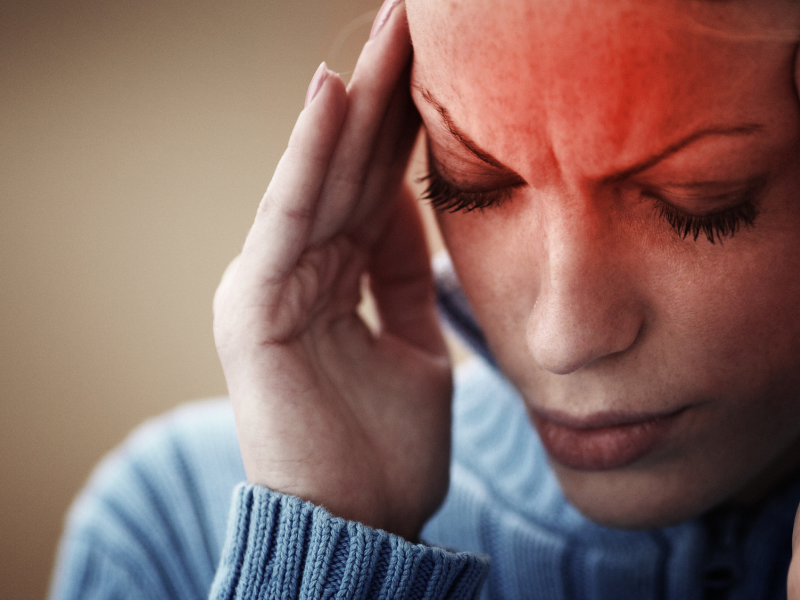Secondary headaches: Cause, Symptoms and Treatment

Headaches are a common ailment that most individuals experience at some point in their lives. While primary headaches, like tension-type headaches and migraines, are well-known, secondary headaches are equally significant and may indicate underlying health issues.
What is a secondary headache?
Unlike primary headaches, which are standalone conditions, secondary headaches arise from underlying medical conditions or other factors. These headaches act as warning signs, signaling an issue within the body that requires attention. Identifying the root cause of secondary headaches is crucial for effective management and treatment.
Types of secondary headaches and causes
Secondary headaches that are not necessarily hazardous and resolve after the primary ailment is treated include:
1. Sinus headache: Sinus headaches are a manifestation of sinus infections, known as sinusitis. These headaches are characterized by a dull pain felt behind the eyes, in the cheekbones, forehead, or the bridge of the nose.
The inflammation and pressure in the sinus cavities contribute to pain and discomfort. Generally, sinus headaches subside as the sinus infection resolves on its own.
2. Dehydration headache: When your body lacks the fluid it needs you may experience a dehydration headache. Headache pain is often accompanied by other symptoms of dehydration, such as dizziness, extreme thirst, and a dry mouth.
Typically, the pain diminishes after rehydrating, resting, and taking pain relief medication. Proper hydration is crucial for overall health and headache prevention.
3. Medication Overuse headache: Excessive use of certain medications, especially pain relievers, can lead to headaches. This phenomenon, known as medication-overuse headache (MOH), requires careful management.
MOH is also referred to as ” rebound headaches”. It’s uncommon but widespread. It affects at least 1% of the people worldwide.
Types of secondary headaches that may indicate a serious or potentially life-threatening condition include:
1. Spinal headaches: Intense headaches resulting from spinal fluid leakage after a spinal tap. While most can be treated at home, prolonged untreated spinal headaches may lead to life-threatening complications like subdural hematoma and seizures.
2. Thunderclap headaches: Extremely painful headaches that develop suddenly. The pain intensifies within one minute and lasts at least five minutes.
Some thunderclap headaches may be harmless. However, immediate medical attention is crucial, as they can indicate:
· Head injury- Secondary headaches often result from head trauma or injuries. Concussions, skull fractures, or other head injuries can trigger persistent headaches as the brain responds to the trauma.
· Neck and spine injury- Conditions affecting the neck and spine. This includes cervical spondylosis or herniated discs. The pain can radiate to the head causing secondary headaches.
· Brain bleed due to trauma and brain injury
· Inflamed blood vessel
· Sudden rise in blood pressure
· Hemorrhagic stroke due to ruptured blood vessel in the brain
· Narrowed blood vessels surrounding the brain
· Changes in blood pressure in late pregnancy
· Meningitis
· Aneurysm
Other causes of secondary headaches include:
· Dental Problems: Dental issues, including teeth grinding (bruxism) or temporomandibular joint (TMJ) disorders. These may manifest as secondary headaches due to the strain on facial muscles.
· Eye Problems: Refractive errors, eye strain, or underlying eye conditions can cause secondary headaches.
· Hormonal Changes: Fluctuations in hormonal levels may contribute to secondary headaches in some individuals. These may occur during menstruation, pregnancy, or menopause.
When Should You See a Doctor?
· The headache will never go away.
· Your headache always seems to be in the same spot.
· You have a fever, chills, and are gaining weight
· If you’re suffering from a thunderclap headache. Go to the emergency room.
· When you move from standing to lying down, your headache alters.
· When you cough, sneeze, or strain, you get a headache.
· It’s a new headache, especially if you’re over 50 or have a medical condition such as cancer or a blood clotting disease.
· You have headaches a lot more often, or things alter dramatically in other ways.
· If you are weak on one side of your body, pass out, have difficulty walking, or have any neurological symptoms that concern you.



